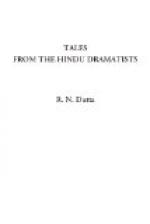“Thou shalt die at this spot on the full moon day of Baisakh.” After many entreaties, the heavenly voice prescribes a relief, “Thou art safe if thou canst pass through the legs of a Brahmin skilled in music and gratified with a fee.” Charayana, just the kind of Brahmin required, arrives at this juncture. The king and the queen are present. Mekhala and the queen, both overcome with concern, entreat Charayana to be the Brahmin that shall preserve the life of the former. He consents. As Mekhala tries to pass between his legs, he mounts on her back and says, “you are now caught in your turn. You deceived me once. Now marry me.” He triumphs in the humiliation he has inflicted on her. The queen now perceives the intrigue of the king, is in her turn incensed, goes off in a pet and resolves to take revenge.
Chandamahasen, the king of Kuntala as a defeated prince now resides with his daughter Kubalayamala under the protection of the victorious king. The king sees her one day as she rises after bathing in the Narbadda. He becomes enamoured of her and wishes to marry her. The queen gets scent of the matter. To prevent the curse of co-wifeship, the queen now resolves to get her husband married to the son of her maternal uncle so that he may be ashamed into abandoning his polygamous tendency.
The king and the Vidushaka seek the garden, where it is now moon-light. Mrigankavali and her friend Vilakshana also come thither, and the lovers meet: this interview is broken off by a cry that the queen is coming, and they all separate abruptly.
At dawn, Charayana’s wife is asleep. In her sleep, however, she is very communicative, and repeats a supposed dialogue between the queen and the Raja, in which the former urges the latter to marry Mrigankavali, the sister of the supposed Mrigankavarma, come on a visit, it is pretended, to her brother—this being a plot of the queen’s to cheat the king into a sham marriage, by espousing him to one she believes to be a boy.
The Vidushaka suspects the trick, however, and wakes his wife, who rises and goes to the queen. The Vidushaka joins his master. The king, who is already the husband of the princesses of Magadha, Malava, Panchala, Avanti, Jalandhara and Kerala, is wedded to Mrigankavali. As soon as the ceremony is gone through, a messenger from the court of Chandraverma arrives to announce:—
“O queen! His Majesty Chandravarma wishes it to be known that Mrigankavarma is not his son but his daughter. In the absence of a son he dressed her as such to satisfy his desire for a son. Now that a son has been born to him, it is not necessary to keep up the pretence. The king requests you to settle a suitable marriage for her. The sages have prophesied paramount sovereignty for her husband.”
The queen becomes stunned and soliloquises:—
“What is play to me, Providence ordains to be a stern fact. Man proposes, God disposes.” She now finds that she has taken herself in, and given herself another rival wife. As the matter is past remedy, however, she assents with a good grace. The minister is glad that his aims are fulfilled. All are happy, Why should Kuvalayamala alone be sorry? The queen therefore allows her lord to marry Kuvalyamala.




